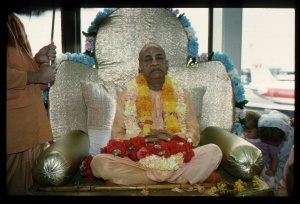SB 3.21.1: Difference between revisions
m (1 revision(s)) |
No edit summary |
||
| Line 1: | Line 1: | ||
{{info | {{info | ||
|speaker= | |speaker=Vidura | ||
|listener= | |listener=Maitreya Ṛṣi | ||
}} | }} | ||
[[Category:Srimad-Bhagavatam - Canto 03 Chapter 21|S01]] | |||
[[Category:Bhagavatam Verses Spoken by Vidura - Vanisource|032101]] | |||
<div style="float:left">'''[[Srimad-Bhagavatam]] - [[SB 3|Third Canto]] - [[SB 3.21: Conversation Between Manu and Kardama|Chapter 21: Conversation Between Manu and Kardama]]'''</div> | |||
<div style="float:right">[[File:Go-previous.png|link=SB 3.20.53]] '''[[SB 3.20.53]] - [[SB 3.21.2]]''' [[File:Go-next.png|link=SB 3.21.2]]</div> | |||
{{RandomImage}} | |||
==== TEXT 1 ==== | ==== TEXT 1 ==== | ||
<div | <div class="verse"> | ||
vidura uvāca | :vidura uvāca | ||
svāyambhuvasya ca manor | :svāyambhuvasya ca manor | ||
vaṁśaḥ parama-sammataḥ | :vaṁśaḥ parama-sammataḥ | ||
kathyatāṁ bhagavan yatra | :kathyatāṁ bhagavan yatra | ||
maithunenaidhire prajāḥ | :maithunenaidhire prajāḥ | ||
</div> | </div> | ||
| Line 17: | Line 23: | ||
==== SYNONYMS ==== | ==== SYNONYMS ==== | ||
<div | <div class="synonyms"> | ||
viduraḥ | ''viduraḥ uvāca''—Vidura said; ''svāyambhuvasya''—of Svāyambhuva; ''ca''—and; ''manoḥ''—of Manu; ''vaṁśaḥ''—the dynasty; ''parama''—most; ''sammataḥ''—esteemed; ''kathyatām''—kindly describe; ''bhagavan''—O worshipful sage; ''yatra''—in which; ''maithunena''—through sexual intercourse; ''edhire''—multiplied; ''prajāḥ''—the progeny. | ||
</div> | </div> | ||
| Line 24: | Line 30: | ||
==== TRANSLATION ==== | ==== TRANSLATION ==== | ||
<div | <div class="translation"> | ||
Vidura said: The line of Svāyambhuva Manu was most esteemed. O worshipful sage, I beg you—give me an account of this race, whose progeny multiplied through sexual intercourse. | Vidura said: The line of Svāyambhuva Manu was most esteemed. O worshipful sage, I beg you—give me an account of this race, whose progeny multiplied through sexual intercourse. | ||
</div> | </div> | ||
| Line 31: | Line 37: | ||
==== PURPORT ==== | ==== PURPORT ==== | ||
<div | <div class="purport"> | ||
Regulated sex life to generate good population is worth accepting. Actually, Vidura was not interested in hearing the history of persons who merely engaged in sex life, but he was interested in the progeny of Svāyambhuva Manu because in that dynasty, good devotee kings appeared who protected their subjects very carefully with spiritual knowledge. By hearing the history of their activities, therefore, one becomes more enlightened. An important word used in this connection is parama-sammataḥ, which indicates that the progeny created by Svāyambhuva Manu and his sons was approved of by great authorities. In other words, sex life for creating exemplary population is acceptable to all sages and authorities of Vedic scripture. | Regulated sex life to generate good population is worth accepting. Actually, Vidura was not interested in hearing the history of persons who merely engaged in sex life, but he was interested in the progeny of Svāyambhuva Manu because in that dynasty, good devotee kings appeared who protected their subjects very carefully with spiritual knowledge. By hearing the history of their activities, therefore, one becomes more enlightened. An important word used in this connection is ''parama-sammataḥ'', which indicates that the progeny created by Svāyambhuva Manu and his sons was approved of by great authorities. In other words, sex life for creating exemplary population is acceptable to all sages and authorities of Vedic scripture. | ||
</div> | </div> | ||
__NOTOC__ | |||
<div style="float:right; clear:both;">[[File:Go-previous.png|link=SB 3.20.53]] '''[[SB 3.20.53]] - [[SB 3.21.2]]''' [[File:Go-next.png|link=SB 3.21.2]]</div> | |||
__NOTOC__ | |||
__NOEDITSECTION__ | |||
Revision as of 11:53, 6 May 2021

A.C. Bhaktivedanta Swami Prabhupada
TEXT 1
- vidura uvāca
- svāyambhuvasya ca manor
- vaṁśaḥ parama-sammataḥ
- kathyatāṁ bhagavan yatra
- maithunenaidhire prajāḥ
SYNONYMS
viduraḥ uvāca—Vidura said; svāyambhuvasya—of Svāyambhuva; ca—and; manoḥ—of Manu; vaṁśaḥ—the dynasty; parama—most; sammataḥ—esteemed; kathyatām—kindly describe; bhagavan—O worshipful sage; yatra—in which; maithunena—through sexual intercourse; edhire—multiplied; prajāḥ—the progeny.
TRANSLATION
Vidura said: The line of Svāyambhuva Manu was most esteemed. O worshipful sage, I beg you—give me an account of this race, whose progeny multiplied through sexual intercourse.
PURPORT
Regulated sex life to generate good population is worth accepting. Actually, Vidura was not interested in hearing the history of persons who merely engaged in sex life, but he was interested in the progeny of Svāyambhuva Manu because in that dynasty, good devotee kings appeared who protected their subjects very carefully with spiritual knowledge. By hearing the history of their activities, therefore, one becomes more enlightened. An important word used in this connection is parama-sammataḥ, which indicates that the progeny created by Svāyambhuva Manu and his sons was approved of by great authorities. In other words, sex life for creating exemplary population is acceptable to all sages and authorities of Vedic scripture.